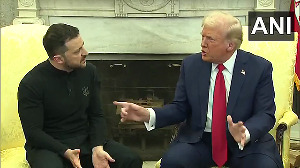India's three-year old futures and options market has fast become a haven for retail investors, but analysts say limits on the size and types of deals has kept fund managers from using it and is squeezing its growth potential.
Since the regulator introduced the first instrument -- index futures -- the average daily turnover in nominal terms for all the contracts has grown to $600 million, almost equalling that of the cash market.
But individual investors punting on individual stock futures account for two thirds of the total trade, while the more sophisticated index futures and options segments remain virtually untraded in the absence of mutual funds and insurance companies.
"It's cheap and easy to use," said Sandeep Halwasia, an individual investor. He shifted his focus to stock futures after the century-old 'badla' system -- which also allowed individuals to bet on price movements by paying a small fee -- was shut down in 1991 after a payments crisis.
"And the thrill is, it offers an opportunity to make unlimited money by way of speculation," Halwasia said.
But analysts say the market's size is ultimately restricted by the inability of foreign and local funds to make large bets -- or hedge large positions -- using local futures and options.
This in turn has hamstrung the development of the physical market and the potential of the funds
The Securities and Exchange Board of India limits a foreign fund's exposure to individual stock futures and options to $10 million each and to $20 million for index futures.
"Large portfolio investors keen to hedge positions are constrained by the low limits," said U R Bhat, a director at brokerage J P Morgan India Pvt Ltd. "Foreigners prefer to leave their positions unhedged rather than hedge very small portions."
Foreign funds account for just two per cent of derivatives trade, but 14 per cent of the cash market, where they hold considerable sway.
"If funds use derivatives on an ongoing basis, they could protect returns in a falling market and stabilise them over the long term," said D C Anjaria, a risk management expert who was a member of the panel that recommended the launch of derivatives trading in India.
Domestic mutual funds have no caps, but their exposures cannot exceed the values of their cash holdings and they cannot speculate, which has deterred major players.
Also, funds fear turning away investors because the cost of hedging risk through derivatives is high in an illiquid market.
"Liquidity is an issue. Greater fund participation will add depth to the market," said Dileep Madgavkar, chief investment officer of Prudential ICICI Asset Management, India's second largest mutual fund.







 © 2025
© 2025